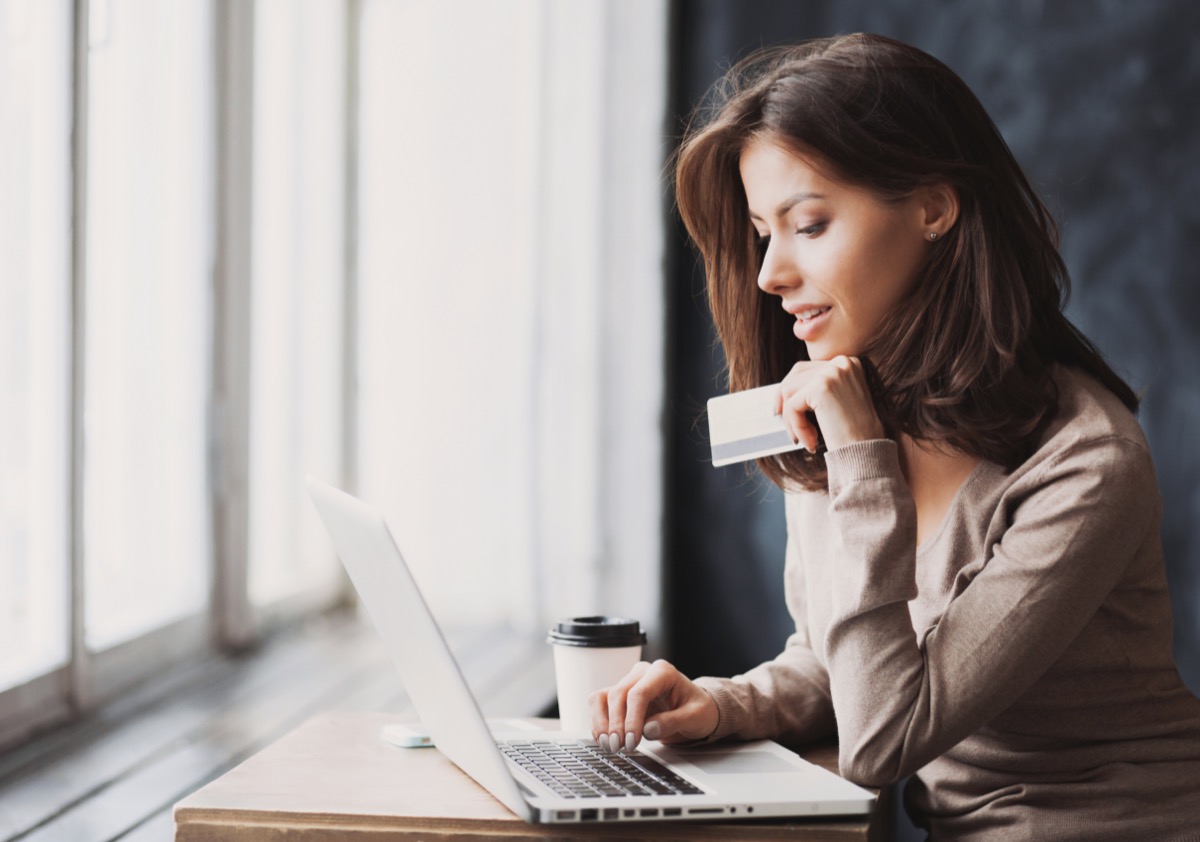The One Thing You Should Do Before Buying Anything on Cyber Monday

In a year when giant crowds and casually strolling store aisles is not a safe option, Cyber Monday is likely to be more popular than ever. But if you plan on searching around for good deals online after Thanksgiving, you need to take some precautions first. There is a known risk of getting hacked or taken advantage of on the internet all the time, but especially during a time that hackers know many people will be divulging details online. The one thing you should do to keep your information secure before shopping online is update your computer’s software and browser. To learn more expert shopping tips, read on, and to see deals curated for your price point, check out The Single Best Cyber Monday Deal For Every Budget, According to Experts.
“You know that annoying message in the corner of your computer screen asking you to install the latest update? It’s easy to press ‘remind me later’ and never update—but this is one of the easiest ways that hackers can get into your device and take advantage of the unpatched vulnerabilities,” says cybersecurity expert Taz Khan.
Updating your browser is the simplest way to ensure you have a safer connection, which will make you less likely to get hacked, as the U.S. Cybersecurity and Infrastructure Security Agency (CISA) confirms. They suggest enabling automatic software updates because “running the latest version of software helps ensure the manufacturers are still supporting it and providing the latest patches for vulnerabilities.”
Updating your browser and software is the first step in keeping your information secure on Cyber Monday. But read on for some more expert tips on how to avoid getting taken advantage of online, and for more advice on keeping your devices safe, check out If You Have This on Your Phone, Delete It Now, Experts Warn.
1
Make sure the URL is secure.

Distinguishing secure sites from unsecure sites is easier than you think. You will know that you’re on a secure site if “the website has HTTPS as opposed to HTTP,” says technology expert Burton Kelso. “The HTTPS means that the website is secure and should be safe from any hacking of information.”
An even simpler indication that you’re on a secure site? Look for the lock sign next to the URL. “If the website doesn’t have a little lock sign at the top of the URL, then it’s definitely not secure to purchase from,” says Khan.
Sometimes even trustworthy sites don’t have this, but you don’t have to write them off right away. “If you’re shopping from a small business that’s family-owned and you notice their website isn’t secure, send them an email or a direct message asking them to secure their site so that you can make a purchase,” suggests Khan. By doing so, “you’ll help the digital ecosystem!”
For added precaution, you can also run any URL through Google’s Safe Browsing site, which will tell you the status of the site’s safety.
2
Adjust your cookie settings.

Another simple trick for securing your internet browsing is reviewing your cookie settings. “Adjust your browser cookie settings and leave only the most essential ones enabled,” note the online security experts at NordVPN. Blocking the majority of cookies is helpful because “third-party cookies or super cookies (some malicious) will track your online activity and display ads” (that’s why you always see those shoes you window-shopped when you’re reading an article online). Here’s a helpful guide on how to disable your cookies.
3
Don’t use public WiFi.

“Don’t use public or free WiFi without using VPN on your devices,” warns Harman Singh, the director of cybersecurity company Cyphere. A VPN is a private network that encrypts and transmits data, allowing you to surf sites privately and securely. (Here are some you can try for free.) If you need to use public or free WiFi, consider investing in a VPN.
4
Verify the seller.

Fake sellers could be anywhere, even on reputable sites like Amazon, so you should verify any merchant before you buy something from them. “Try to stick with mainstream online stores to cut down your risk of hacking,” suggests Kelso.
If you want to buy from a new site, remember “a little research goes a long way if you’re not sure who you’re buying from,” notes NordVPN. If the site is a scam, it may already be reported somewhere online. And for more on safe shopping, beware that You Could Get Banned From Amazon For Doing This Common Thing.
5
Don’t shop through an email link.

Emails boasting great deals from our favorite stores are always a welcome addition to our inbox, but they could also be scammers in disguise. “Never click on the links you receive in emails as they could be phishing scams,” says Sam Curry, chief security officer at Cybereason.
“One of the most popular scams run by hackers is a phishing email purporting to be from a retailer with a great holiday offer of 25 percent or 50 percent in total savings,” says Curry. “Be suspicious and instead, cut-and-paste the promo codes in the emails and go directly to the retailer’s websites for more information.” And if you’re looking to score big at one of the most popular retailers, know that This Is the Best Time of Month to Score Walmart Deals.
6
Use a credit card instead of a debit card.

The CISA suggests using a credit card for online purchases rather than a debit card. “There are laws to limit your liability for fraudulent credit card charges, but you may not have the same level of protection for your debit cards,” they explain. “Additionally, because a debit card draws money directly from your bank account, unauthorized charges could leave you with insufficient funds to pay other bills.”
7
Don’t sign in using a social media platform.

It can be so simple to sign in to a shopping site using your Facebook or Instagram account, but this leaves a lot of your information vulnerable. “Never, ever sign in through a social media app to browse a shopping site and especially to pay at one. Social media sites like Facebook are notorious for taking your data and selling it to the highest bidder,” says CEO of Gadget Review Rex Freiberger. “They already have so much data just from users, and you’re voluntarily sending so much more when you use their app to sign in to an eCommerce site.” And for more useful tips delivered straight to your inbox, sign up for our daily newsletter. (It’s safe, we promise!)
8
Use strong passwords.

Creating strong passwords is essential to keeping all of your most confidential information safe online. Singh suggests making an extremely strong password and then adding modifiers to it for each account you make to ensure variety across sites. You can also use an online password manager site to securely keep track of all your passwords. And for more on keeping your log-in info in order, check out The Single Best Way to Store Your Passwords Safely Online.